Teaching spelling
0 Replies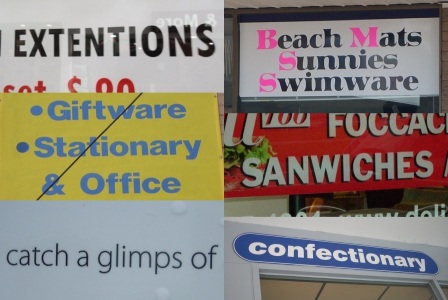
In a Grade Prep classroom recently, I wondered why the teacher was getting the children to repeat the following sentence:
“Big elephants can’t always understand small elephants”.
Then I realised she was teaching five-year-olds a mnemonic for the spelling of the word “because”. Big elephants often can’t understand little elephants? Some days in schools, my jaw drops more than others.
Teaching spelling the word “because”
The word “because” only has one sound spelt unusually. The rest of it is perfectly sound-outable, including the “se”, typically used after a vowel digraph, see this list).
The tricky spelling is the “au”, which usually represents the sound “aw” as in “launch” (click here for more words), but in the word “because” represents the sound “o” as in “fault”, “auction”, “sausage” (and some other words, see a list here).
Creative writing
6 Replies
One of the things very young children are encouraged to do in my local schools is creative writing. Putting your personal ideas on paper is a highly valued skill in our education system.
Of course, the kids I work with can’t do it. They stare at the blank page and get some chicken scratchings down, but their letters are poorly formed, they can’t spell the words they want to write, and quite often when they’re finished, even they can’t read it. The whole process makes them feel like failures.
These children have creative ideas, all right, and all but the language-impaired ones can easily tell you about them. In fact, sometimes it’s hard to stop them from talking about their creative ideas long enough to get some written work done. I’m currently a working with one Grade 2 group which is an exercise in hilarity, as they riff off the words we’re working on spelling, one-up each other with funny stories, and devise alternative endings for my decodable books.
 In praise of Creative Talking
In praise of Creative Talking
I recently came across the following by teacher Fay Maglen in the very useful but now apparently out-of-print book Wordswork:
“…adults expect written evidence of work and creative expression too early, to the point, perhaps, of inhibiting the free flow of oral expression. Certainly it would seem that in some classrooms more value is placed on what children write than on what they say…
double consonants
1 Replies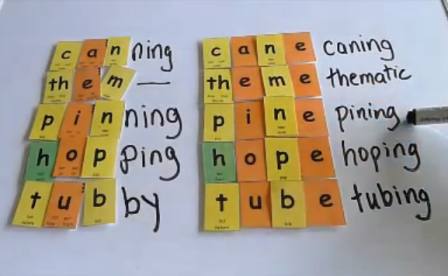
We have 20 vowels in English but only 5 dedicated vowel letters, so we have to make our vowel letters work quite hard.
We often double vowel letters themselves to represent different sounds (e.g. sad v/s Saab, ten v/s teen, non v/s noon, Wifi v/s Wii) but we also represent different vowels by doubling the consonants that follow them.
It's quite hard to write a blog post that makes sense about this, without descending into a whole lot of linguistics jargon, so I have made a little video clip about this which I hope you find helpful:
Spelling mistakes
0 Replies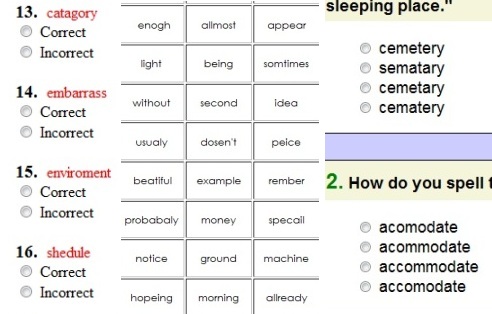
One thing I wish I could take a blowtorch to in all spelling resources is the "find the correct spelling in among all these spelling mistakes" activity.
You can go into any remaindered bookshop or newsagent that sells children's literacy activities and find stacks of these spelling mistakes activities, often in the "hothouse your child for NAPLAN" workbooks in the carousels by the door.
Why the people who made up NAPLAN put such questions on the test in the first place, thus encouraging children around the country to practice looking at spelling mistakes, and be exposed to hundreds and hundreds of spelling mistakes that they otherwise would not see, I really have no idea.
Each time a learner sees spelling mistakes, a potential outcome is that they will put them into their memory bank, thereafter being more confused, not less, about how to spell these words.
Even in some quality materials
Spelling mistakes activities are common in trashy spelling activities on the internet, and the sort of workbooks that go straight to remaindered, cheap-as-chips bookshops. Please beware of anything published by the many lay, self-appointed language experts out there, and look for materials written by people who understand sound-letter relationships, language more generally, and the literacy research.
Beware phonics amateurs
1 Replies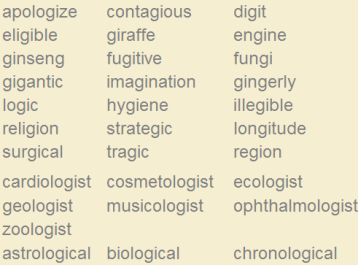
I've been busy working on my spelling lists, but it can get a bit boring going through the dictionary and thinking about all the allowable sound combinations, so I'm sometimes tempted to take shortcuts by looking at other spelling lists on the internet. Perhaps I've listened to too many Tom Lehrer songs (you can listen to that while you read, can't you?!?).
For example, today I am looking for extra words with the letter g representing both the sound "g" as in gate, geese, girl, goat and gum, and the sound "j" as in gaol, gel, gist and gym.
After lunch and before my coffee kicked in, I googled "soft g sound" and found a page with a long spelling list. A lot of them were words in which the single letter g does in fact represent the sound "j", for example:
|
gem |
gym | cage | giant | margin | agent |
| gel | gyp | wage | digit | logic | angel |
| germ | age | huge | gentle | tragic | legend |
However, quite a lot of them had the spelling "ge" representing this sound:
| bilge | cringe | forge | fringe | gorge | hinge |
| large | plunge | singe | urge | challenge | discharge |
| dislodge | emerge | enlarge | orange |
This is typically how the sound "j" is spelt after two-letter vowel spellings, or after consonants (though it's also at the start of the name "George").
A few other words had the spelling "dge", which is typically used after one-letter "checked" or "short" vowels:
| bridge | dodge | grudge | nudge | fledge |
| sledge | smudge | cartridge | knowledge |
Some also had the spelling "gi" for the target sound:
| legion | region | hygiene | religion | plagiarize | contagious |
Spelling lists should make a point about spelling
0 Replies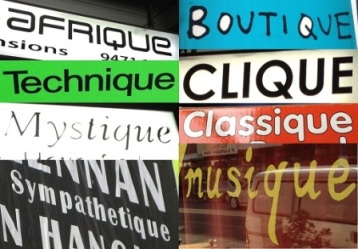
Here’s a May 2012 spelling/vocab list from a mainstream Victorian secondary school: “text, question, reason, persuade, introduction, conclusion, action, technique, body”.
These words are closely related by meaning, but not by spelling.
They’re a mixture of one, two, three and four-syllable words. Some have tricky spellings, like the “u” in persuade (also in suave, cuisine, suite, language, iguana, penguin, squirrel, Ecuador and quick) and the “que” in technique (also in mosque, cheque, torque, boutique, critique, Mozambique, oblique, unique and queue).
“Technique” is doubly tricky because of its Greek “ch”, also found in anchor, bronchitis, character, chemist, Christmas, echidna, mechanic, school, scheme and the common names Chris, Nicholas, Michael, Lachlan, Chloe and Zachary. (more…)


